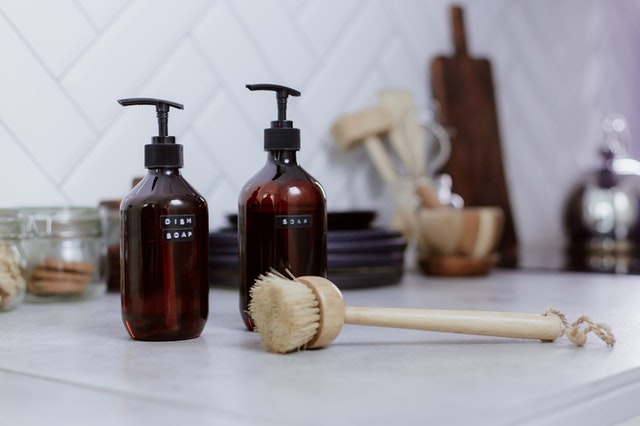If you’re out of dishwasher detergent, you may consider using regular liquid dish soap as a substitute.
Although pouring dish soap in a dishwasher seems convenient, it’s not recommended.
Putting dish soap in a dishwasher can generate so many suds that will cause the dishwasher to overflow. Dish soaps are formulated to wash dishes by hand and contain ingredients that won’t work to tackle soils and stains the dishwasher way. Contrarily, dishwasher detergents are made from a complex combination of ingredients that work in specific ways and conditions to achieve effective and efficient cleaning.
Using dish soap in the dishwasher has a lot of problems that outweigh the benefits. Below we take a look at these problems as well as the many practices you’re adopting that might already be detrimental for your washer.
Why Should You Never Use Regular Liquid Dish Soap In A Dishwasher?
To start off, the formulations of both cleaners are quite different with dishwasher detergents fine tuned to suit the conditions of cleaning inside a dishwasher as well as to be compatible with the way dishwashers work.
Dish soaps on the other hand are made to suit the “hand washing” style of cleaning dishes.
Here’s what I mean by that.
Dishwasher detergents contain surfactants that do not form too much suds, unlike dish soaps that make us feel they rely only on suds to wipe plates clean.
That’s understandable because dishwashers pair hot water spritz together with suds, builders and biosubstances in the detergent to achieve sparking pots and pans.
Substituting dish soaps for dishwasher detergents is a quick way to inhibit washing action through formation of too many suds that can lead to overflow, poorly washed dishes and even a blocked filter.
Dishwasher detergents also rely on the action of builders in their detergents to soften hard water and trap metal ions that would adversely interfere with cleaning.
Some of your regular dish soap may not have that specific type of builder which can lead to serious problems like poorly washed dishes, spotting due to the presence of minerals in water, and also limescale build up.
Furthermore, the water in a dishwasher needs to be highly alkaline to make cleaning efficient, and the dishwasher ensures this happens through elements in the detergents called alkalis.
Your regular dish soap cannot give your wash water that degree of alkalinity without burning your hands, so in essence it means you won’t be getting that sparkling look on your pots should you opt to use dish soaps in dishwashers.
In short, dishwashers are complex machines that are able to do the dishes for us, and because of how complex they are, only specially formulated detergents like the automatic dishwasher detergents can ever go in them and do a good job at cleaning.
Used The Wrong Soap In Your Dishwasher?
The easiest way to avoid a massive, painful cleanup job is to ensure you don’t put dish soap in your dishwasher.
But if you’ve fallen victim to the practice of using dish soap in the dishwasher, do not panic and get ready to act quickly.
Here’s what you should do
- Use towels to clean the “overflow mess” on the floor. Next, remove the foamy lather around the dishwasher’s seals and door.
- Take out your dishes from the dishwasher. Don’t wait for the water to cool down because the longer the dish soap sits over the dishes, the harder it will be to remove the spots left over them. You can add ice cubes to accelerate the cooling process.
- Use a small container to scoop out the bubbles. After that, wipe down the dishwasher with a piece of cloth or towel. If you can’t remove all the bubbles with a container, put a few tablespoons of salt into one cup of vinegar and add this mixture to your dishwasher. Now, run the wash or rinse cycle for a while. The vinegar and salt will nullify the effect of dish soap. If you don’t see a difference, add more salt and vinegar before rerunning the cycle.
- After the soap remnant disappear, use a few dry towels to soak the remaining moisture. Moreover, remove the dish soap residue from the soap slot.
- Lastly, run the rinse cycle to clear any remaining dish soap residue from your dishwasher.
The Emergency Alternatives
Relying only on dish soap to do the dirty work is a big no in the dishwasher, but that doesn’t mean dish soaps are completely banned from the soap slot, you can make a quick emergency solution that works great on dishes.
Here’s how:
Fill 3/4 of the soap slot recommended capacity with baking soda (to minimize sud build up), then fill up to capacity with liquid dish detergent of your choice. You can add salt if you have hard water at home. Next, run the dishwasher.
That’s all, your dishes should come out clean, and bonus, your dishwasher smell might also get wiped off in the process!
DIY Dishwasher Detergent Recipe.
Does the idea of homemade dishwasher detergent sound appealing, but you’re not quite sure how it could work? Of course, it’s natural to be skeptical at first.
Homemade dishwasher detergent is a no-brainer if you already have the ingredients in the house. In addition, the price to performance ratio is outstanding.
Let’s see how to make a DIY dishwasher detergent.
Gather the following ingredients:
- Borax (one cup).
- Washing soda (one cup).
- The citric acid (one to half cup).
- Kosher salt (half cup).
Mix thoroughly and store in a canister.
To use, simply load the soap slot with the recommended volume of detergent. You can pour white vinegar or lemon juice into the compartment for a DIY rinse agent.
This homemade dishwasher detergent will help remove the toughest gunk, shine glassware to a squeaky-clean luster, and provide a more holistic means of cleaning your dishes.
Since this DIY formula has citric acid, it will likely clump over time. However, there are ways to fix this situation and make it clump less.
Another tip is to keep the mixture uncovered for a day or two and stir frequently. After that, you can store it with a lid in an old container or can.
Or you can skip citric acid while making the detergent and add it separately to each dishwasher load.
Top 6 Mistakes You Make With Your Dishwasher
You love popping dirty dishes into your dishwasher and pulling out a clean load.
But sometimes, even when you follow the same steps, your dishwasher doesn’t seem to work quite right.
What’s going on?
Maybe you’re making one of these common mistakes. Check out this list and make sure you’re not guilty of any of them!
You Overload Your Dishwasher
It might seem like cramming more dishes into the dishwasher would do the trick, but it makes the unit work harder.
If dishes are stacked too tightly, there will be no room for water to reach certain parts of your dishes. As a result, they won’t come out properly cleaned.
You Put Detergent Packs Directly Into the Dishwasher.
Detergent packs should go into a dispenser that releases them at the appropriate time during the cycle.
If you throw the pack directly into the machine, it will dissolve in the pre-wash and won’t be there when the main washing cycle starts.
You Pre-Rinse Dirty Dishes.
Dishwashing detergents break down fats, proteins, and starches found on the surface of your dishes.
Moreover, the chemicals in these products should penetrate and cling to the grease and oil for better cleaning.
That’s why you need to let them sit for a few minutes instead of pre-rinsing so they have time to bind with food particles and grease.
You Don’t Remove Solids From the Dishes.
You should remove food scraps, dried-on bits, and other debris from the bottom of your dish so they don’t clog the filter.
The detergent will do its job more effectively if you pull out the most stubborn coatings of gunk from your dishes.
You Use More Detergent Than Necessary.
Extra detergent cannot fix the problem of your dishes being dirty after going through a whole dishwasher cycle.
The excess soap will cause a buildup on the interior of the dishwasher and dishes, leaving you with an unpleasant odor and cloudy glassware.
If your dishes aren’t coming out clean, there is likely another issue at play. It’s essential to run your dishwasher once a week, even if it’s not full.
You Don’t Clean the Dishwasher Filter.
The dishwasher filter collects bits of food and other debris that flow through the dishwasher. Over time, this buildup can impact the performance of your dishwasher.
If you notice your dishwasher isn’t cleaning dishes as well as it used to, or if it’s leaving spots or streaks on plates, the filter is probably dirty and needs to be cleaned. Therefore, you MUST clean the filter monthly for its optimal functionality.
Surprising Things That Can Ruin Your Dishwasher
Did you know dish soap isn’t the only soapy substance to avoid in your dishwasher? Even a high-quality handwash can cause residue buildup and shorten the appliance’s life.
Bubbles are one of the first things we associate with dishwashing liquid. But a dishwashing detergent doesn’t necessarily need to produce bubbles to do its job. A bubbly, foamy product can do more harm than good in a dishwasher.
Here are five other things to watch out for if you want to keep your dishwasher running like a champ:
- Laundry detergent
- Shampoo
- Car-washing solvent
- Body wash
- Pressure washer solution
Some of the soaps above might seem like no big deal, but their effects extend far beyond unwanted drips and a messy kitchen. You can end up getting sick as these cleaning agents aren’t food-safe.
Final Words
Dishwashing detergent is specifically designed to work in dishwashers and contains ingredients that help break down food without creating foam.
If you’re out of detergent and need to do a load of dishes, try diluting dish soap with baking soda and warm water to avoid a soapy disaster.
It may not be as effective as detergent at removing tough stains, but it will help cut through grease and grime.
You can also make a homemade detergent with natural ingredients. It’s time to whip up some good old-fashioned cleaning!

